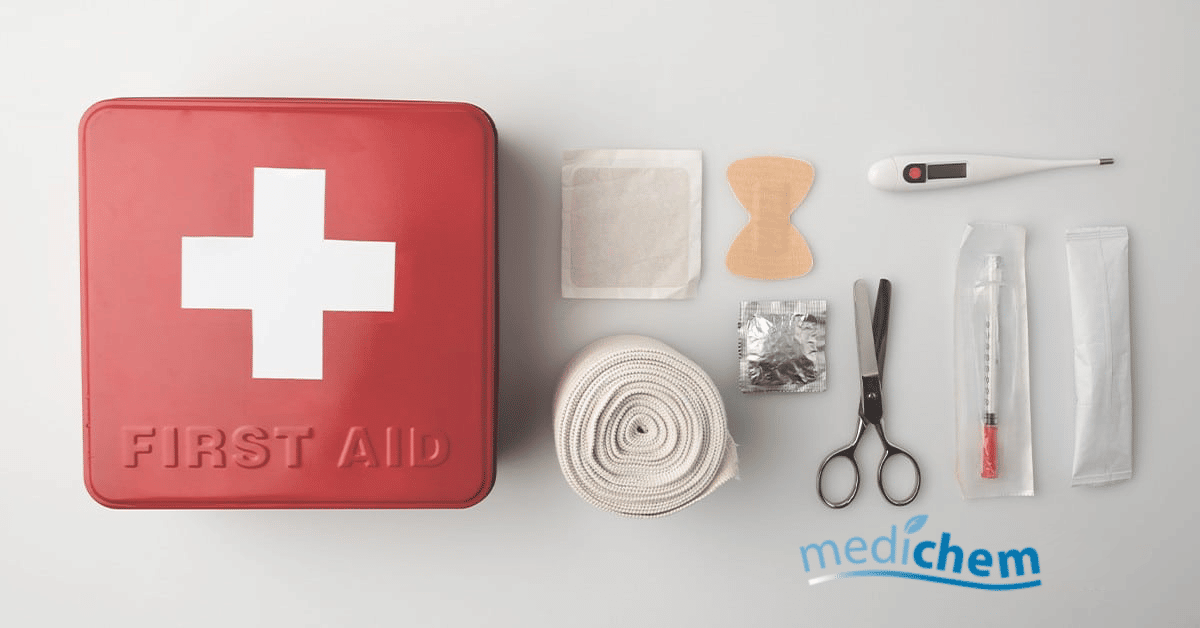First Aid Supplies for Schools in Ireland
It’s always a busy time for schools and creches – so safety is an issue that needs to be taken care of regularly. In all the rush and excitement to get ready for the school year ahead, it can be easy to forget that first aid kits need to be checked regularly and supplies updated. This short guide will help you be ready for any issues that are common in childcare settings. Be prepared for the scratched knees, playground injuries and general hygiene issues that crop up in your average school day.
What should you include in your School First Aid Kit and why?
A school emergency kit is a kit that is packed and ready to go on the off chance of an emergency. It is a crucial resource for schools, and one that should be prepared with care.
The first step in creating a school first aid kit is to identify what items are essential for the safety of students and staff. This includes items such as: first aid supplies, bottled water or other provisions, protective gear (goggles, gloves), emergency kits, and always having the basics such as food and water for the duration of an emergency.
Teachers and First Aid
Teachers are required to have protocols around the administering of medication and suitably equipped First Aid boxes. However, it is ‘good practice’ for all adults in a school or childminding setting to equip themselves with some First Aid knowledge. There are many training courses around Ireland that offer specific children and paediatric training at various levels. There are many different types of training in First Aid with advanced levels for those who work in the healthcare industry. From knowing what to do with a small burn to performing CPR, First Aid is a valuable skill to have at schools or in childcare facilities.
Teachers should feel equipped and suitably trained to deal with a range of topics such as:
- Calling the Emergency services
- The Choking Casualty – Adult, infant, child
- CPR – Adult, Infant, Child
- Infantile Convulsions, Meningitis
- Bumps and Bruises
- Temperature Control
- Fainting
- Burns
- Poisons Prevention
Having the right first aid supplies really helps teachers deal with emergencies when they arrive.
We have outlined some of the essentials that should be in every school first aid kit.
Dressings
- Plasters – buy them in a variety of sizes for minor cuts, blisters and sore spots.
- Adhesive tape – this can hold dressings in place. You can also apply it to smaller cuts.
- Bandages – crepe bandages are useful for support or holding a dressing in place. Tubular bandages are helpful when a child has strained a joint and needs extra support. You can also buy triangular bandages that you can use for making a sling.
- Sterile gauze dressings – these are good for covering larger sore areas and cuts.
- Scissors for cutting clothes, and also plasters and tape to size.
- Safety pins – these are used to secure an arm sling in place around the elbow area.
Tweezers
You use tweezers to remove sharp, pointed objects like spikes and thorns. Never use tweezers to remove objects from the nose, mouth or ears – seek medical attention.
Hand sanitiser
When giving first aid, it is important to take the necessary steps to avoid spreading any germs.
Try washing your hands before and after giving first aid, so that you avoid getting dirt from the injury or potentially infecting or spreading any germs. If you do not have access to water, hand sanitiser is a good option.
Disposable gloves
Gloves are an essential first-aid supply. They can protect you as well as the injured person from infection while also shielding them against open wounds and bleeding.
You should ideally use sterile-type gloves when dealing with open wounds.
Non-sterile gloves can be used if you need to protect yourself only. For example, when cleaning up blood spills, or dealing with excrement and vomit.
Antiseptic cream or spray
Antiseptic cream or spray can be applied to cuts or grazes after cleaning. This will help prevent infection. Some may also help to numb pain.
If not near cool running water, burn gels are fine. If available, place the wound under cool running water for 20 minutes if possible.
Antiseptic wipes
Antiseptic wipes are a handy way to clean cuts and grazes and help prevent infection. To use them, take a fresh wipe and clean the wound. Work gently away from the centre to remove dirt and germs.
Absorbent pads
Use absorbent pads to lightly apply pressure to a wound that is bleeding. Do this until the bleeding stops. Make sure there is no object stuck in the wound first.
Thermometer
Use a digital or electronic thermometer when possible. These are quick and accurate. You can also use them under the armpit. Always place the thermometer under the armpit for children under 5.
A temperature of 38°C degrees Celsius (100.4°F) or above is high for a child.
High temperatures are often caused by common illnesses like colds, flus or mild infections. They usually get better within 3 days.
Saline solution and eye bath
This is useful for washing specks of dust or loose particles out of sore eyes.
Saline solution is a sterile water-based solution that is used to rinse the eyes. It can be used for washing specks of dust or loose particles out of sore eyes.
Ice Packs
Ice packs can be used for minor head injuries. They can be used for short periods of time regularly for the first few days. They can help to bring down any swelling.
For when you’re out and about
If you are away from school on trips or school outings, you might not be able to access clean water.
The following items may be useful to include in your travel first aid kit:
- Burn gel
- Sterile water, in a sealed disposable container, for wound cleaning
- Hand sanitiser
- Plasters, dressings
Important Reminders
First aid does not replace medical care. Seek medical help at any stage if in doubt. Phone 112 or 999 in an emergency
Call 112 or 999.
Some other essentials to remember:
Make First Aid Kits Easily Available
The first aid box should be waterproof and easy to carry. This should be in a dedicated area with specific signage. You should keep it locked and store it out of the reach of children.
Many schools also have a dedicated travel kit for emergencies.
Don’t store medication in kit
As most schools are very aware of, don’t store any medication in your first aid kit. Keep all medication in a locked cupboard with access only given to specific adults.
Stay Hygienic
Wash your hands properly before and after giving first aid.
Check use-by dates
Always check your first aid kit is up to date. Replace used items and check all medicines for any that are out of date, before disposing of them.
First aid manual
An easy-to-use guide can help you remember what to do in an emergency situation. Printed guides make it easy to refer back to when you’re panicked and your child is crying. You could print out a child safety first aid guide and keep it with your first aid box
Medichem First Aid Supplies
Welcome to Medichem. We have developed this website to provide the public and workplace professionals with high quality, affordable first aid supplies.
Our website consists of a wide-variety of content relating to first-aid kits and supplies. Our helpful blogs will keep you up to date on the most current information and advice around health and safety requirements and new products available as well as providing industry specific insights from health and safety managers and pre-hospital care professionals who between them have hundreds of years of experience.
If you are looking to restock your office first aid kit or ensure that your sports first aid kits at your club contain all of the essential products that you need, Medichem.ie is the site for you.
View our full range of first-aid products on our online shop. Do you have a specific question or query? Contact Medichem today. A member of our team will be more than happy to help.


